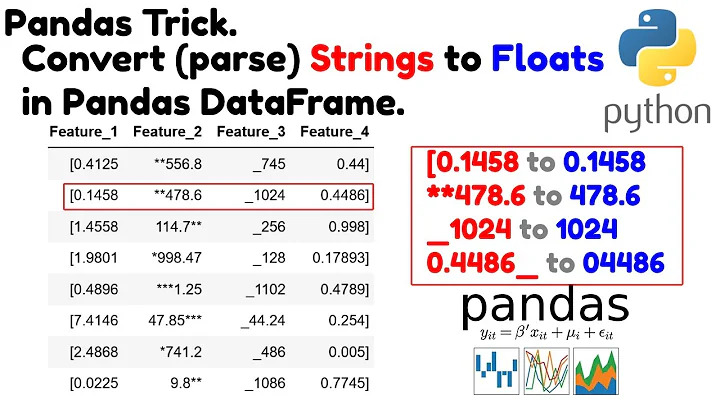Cannot convert list to array: ValueError: only one element tensors can be converted to Python scalars
Solution 1
It seems like you have a list of tensors. For each tensor you can see its size() (no need to convert to list/numpy). If you insist, you can convert a tensor to numpy array using numpy():
Return a list of tensor shapes:
>> [t.size() for t in my_list_of_tensors]
Returns a list of numpy arrays:
>> [t.numpy() for t in my_list_of_tensors]
In terms of performance, it is always best to avoid casting of tensors into numpy arrays, as it may incur sync of device/host memory. If you only need to check the shape of a tensor, use size() function.
Solution 2
The simplest way to convert pytorch tensor to numpy array is:
nparray = tensor.numpy()
Also, for size and shape:
tensor_size = tensor.size()
tensor_shape = tensor.shape()
tensor_size
>>> (1080)
tensor_shape
>>> (32, 3, 128, 128)
Related videos on Youtube
Comments
-
Henning almost 2 years
I'm currently working with the PyTorch framework and trying to understand foreign code. I got an indices issue and wanted to print the shape of a list.
The only way of doing so (as far as Google tells me) is to convert the list into a numpy array and then getting the shape with numpy.ndarray.shape().But trying to convert my list into an array, I got a
ValueError: only one element tensors can be converted to Python scalars.My List is a converted PyTorch Tensor (
list(pytorchTensor)) and looks somewhat like this:[ tensor([[-0.2781, -0.2567, -0.2353, ..., -0.9640, -0.9855, -1.0069], [-0.2781, -0.2567, -0.2353, ..., -1.0069, -1.0283, -1.0927], [-0.2567, -0.2567, -0.2138, ..., -1.0712, -1.1141, -1.1784], ..., [-0.6640, -0.6425, -0.6211, ..., -1.0712, -1.1141, -1.0927], [-0.6640, -0.6425, -0.5997, ..., -0.9426, -0.9640, -0.9640], [-0.6640, -0.6425, -0.5997, ..., -0.9640, -0.9426, -0.9426]]), tensor([[-0.0769, -0.0980, -0.0769, ..., -0.9388, -0.9598, -0.9808], [-0.0559, -0.0769, -0.0980, ..., -0.9598, -1.0018, -1.0228], [-0.0559, -0.0769, -0.0769, ..., -1.0228, -1.0439, -1.0859], ..., [-0.4973, -0.4973, -0.4973, ..., -1.0018, -1.0439, -1.0228], [-0.4973, -0.4973, -0.4973, ..., -0.8757, -0.9177, -0.9177], [-0.4973, -0.4973, -0.4973, ..., -0.9177, -0.8967, -0.8967]]), tensor([[-0.1313, -0.1313, -0.1100, ..., -0.8115, -0.8328, -0.8753], [-0.1313, -0.1525, -0.1313, ..., -0.8541, -0.8966, -0.9391], [-0.1100, -0.1313, -0.1100, ..., -0.9391, -0.9816, -1.0666], ..., [-0.4502, -0.4714, -0.4502, ..., -0.8966, -0.8966, -0.8966], [-0.4502, -0.4714, -0.4502, ..., -0.8115, -0.8115, -0.7903], [-0.4502, -0.4714, -0.4502, ..., -0.8115, -0.7690, -0.7690]]), ]Is there a way of getting the shape of that list without converting it into a numpy array?
-
 Charlie Parker about 3 yearsNot sure if you had the same issue but I was trying to convert a nested list of torch tensors to a bigger tensor that respected the nesting by having more indices/dimensions for the final tensor. I found that incrementally growing the list of torch tensors and then to
Charlie Parker about 3 yearsNot sure if you had the same issue but I was trying to convert a nested list of torch tensors to a bigger tensor that respected the nesting by having more indices/dimensions for the final tensor. I found that incrementally growing the list of torch tensors and then totorch.stackit helped. I wrote a non recursive example but I think it should be easy to extend it. Hope it helps: stackoverflow.com/questions/54307225/… -
user3180 about 3 years@CharlieParker I was trying to do the same thing. it should work. but it doesn't!!
-







![[Solved] ValueError: The truth value of an array is ambiguous. Use a.any() or a.all()](https://i.ytimg.com/vi/-MvHlA75Zxw/hqdefault.jpg?sqp=-oaymwEcCOADEI4CSFXyq4qpAw4IARUAAIhCGAFwAcABBg==&rs=AOn4CLAkXHFl5IvfPrHTwvVyx-uVEHLt9g)

